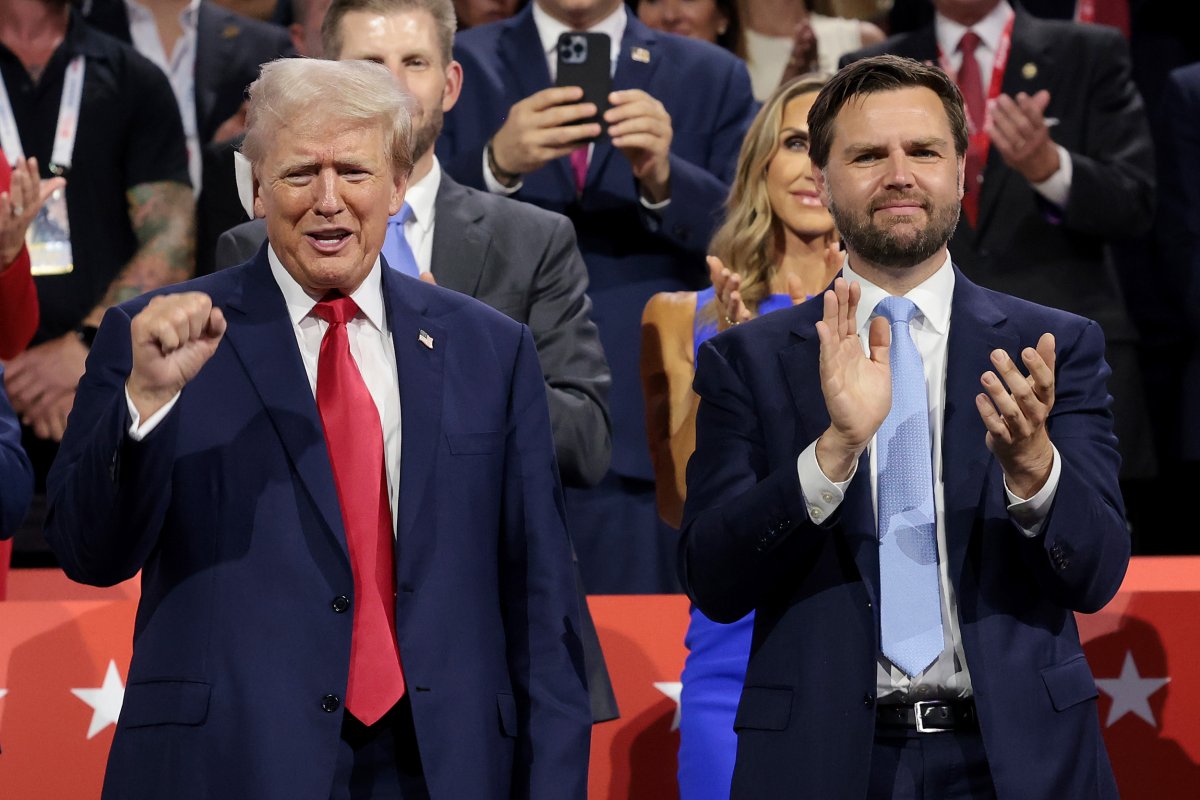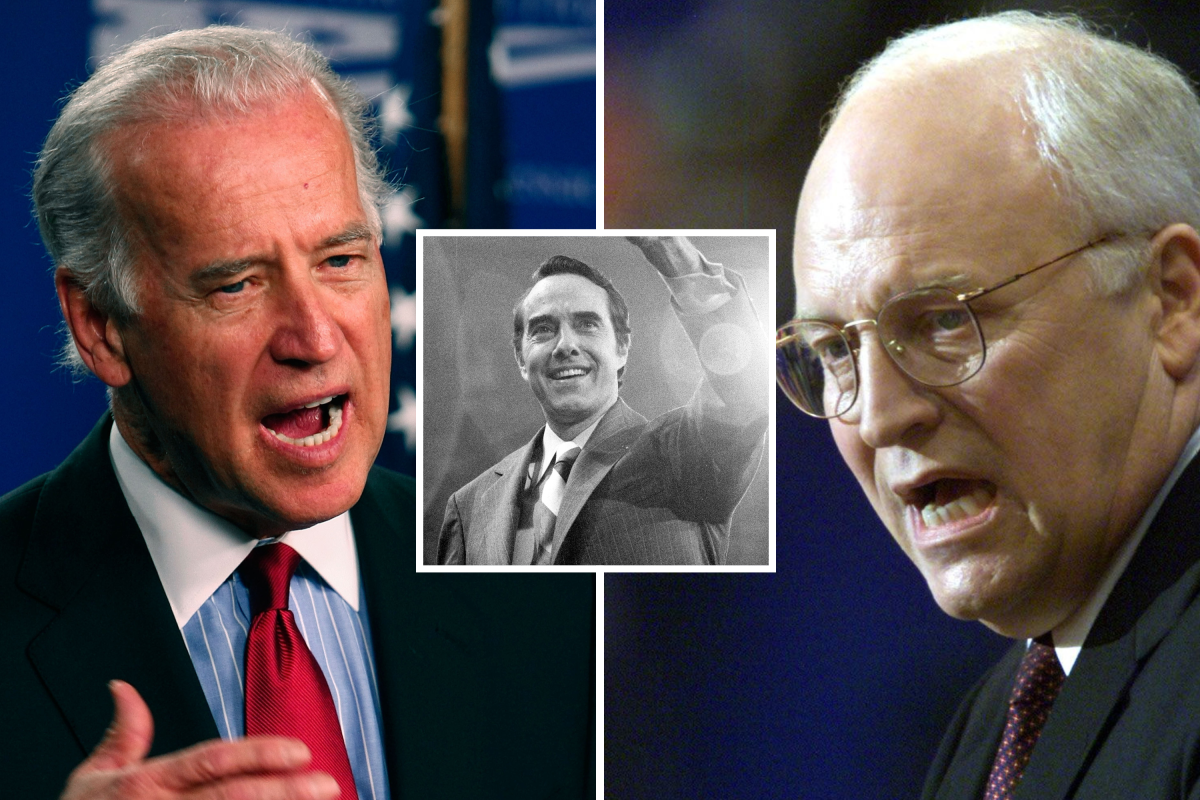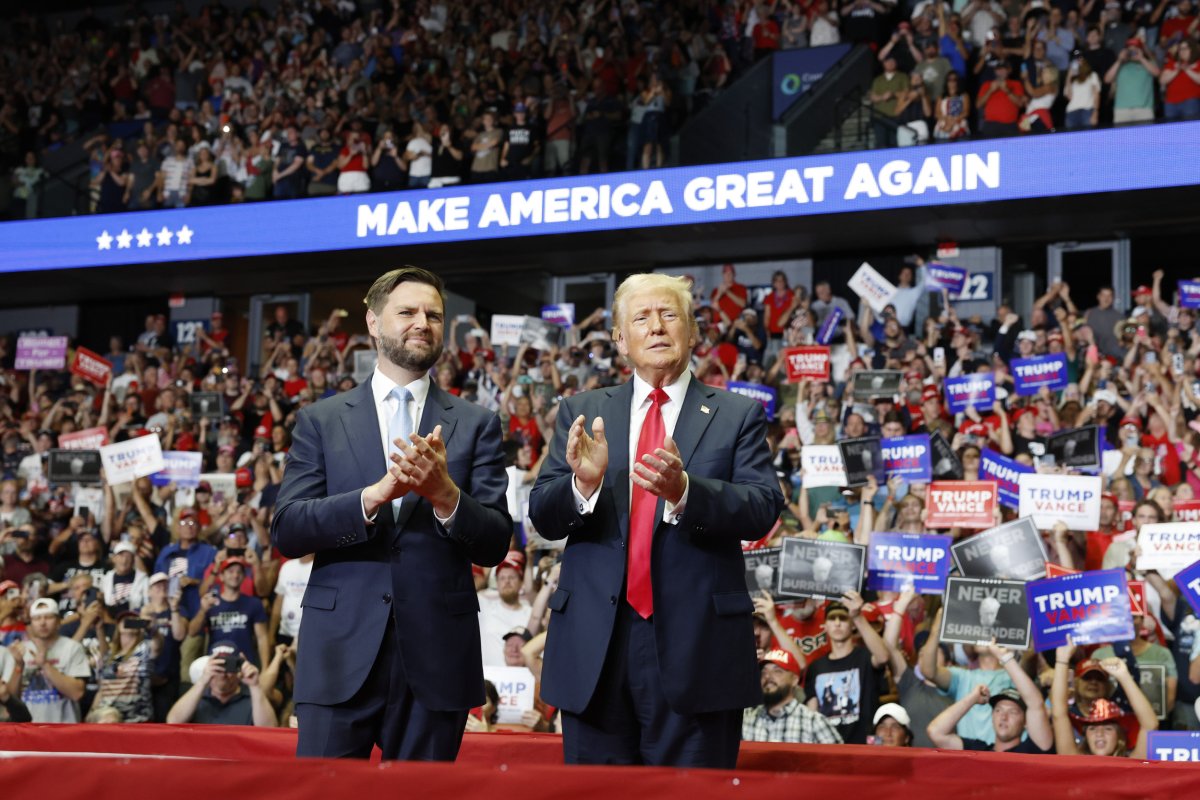JD Vance could be one of the least experienced vice presidents in U.S. history if elected alongside former President Donald Trump in November.
Trump, himself a businessman and reality-television star before he entered the White House, announced Vance as his running mate on July 15. The junior senator from Ohio has only been in public office since January 2023. Before that, he was a venture capitalist, author and also served in the Marines.
So far, it has not been plain sailing for Vance, who has faced criticism for his views on “childless cat ladies,” suggestions that Trump is having second thoughts about him, and unsubstantiated claims that he had sex with a couch.
Vance is also the least liked vice presidential nominee since 1980, according to polls.

Win McNamee/Getty Images
On top of that, his lack of political experience could also be an issue, experts say.
“In terms of the sort of government experience that most VP nominees have (i.e. Prior experience as U.S. senator, state governor, member of U.S. House, or in high federal executive position), Vance has less experience than any VP nominee since newspaper publisher Frank Knox in 1936,” Joel Goldstein, a vice presidential expert and scholar who has written multiple books on the vice presidency, told Newsweek.
“The only others with so little experience were Spiro T. Agnew and Governor Sarah Palin, each of whom had prior experience in local government.”
Following a decade in local government and a brief stint as chair of the Alaska Oil and Gas Conservation Commission, Palin was elected as governor of Alaska in 2006 and tapped as Republican Senator John McCain’s running mate in the 2008 election. Agnew was governor of Maryland for two years before becoming Richard Nixon’s running mate in 1968, and had been involved in local politics before that. Agnew resigned from the vice presidency on October 10, 1973, due to criminal charges of corruption, following an investigation into allegations of bribery, extortion, and tax fraud, which occurred during his political career in Maryland.
Since then, vice presidential nominees have generally tended to rack up the public service miles: Joe Biden spent 36 years in the Senate, Dick Cheney represented Wyoming in the House for a decade (bookended by periods as White House Chief of Staff and Secretary of Defense) and Bob Dole had been a politician for 26 years before President Gerald Ford selected him as his running mate in 1976. A stark contrast to Vance’s short tenure.

Mark Wilson/Arnie Sachs/Paul J. Richards/Getty Images
Max Burns, a Democratic strategist told Newsweek that Vance’s qualifications for the role of vice president were “virtually nonexistent.”
“JD Vance was foisted on Donald Trump by a constellation of Silicon Valley tech billionaires including Elon Musk and Peter Thiel,” he said. Thiel was a co-founder of PayPal.
Newsweek reached out to Thiel via Meta, where he sits on the board of directors, and Musk via Tesla’s press office for comment.
“He can’t relate to real people because he’s spent so long in the libertarian tech bro world that he’s completely forgotten what normal looks like. He’s a gigantic gift to Democrats,” Burns added.
Newsweek emailed a member of Vance’s team for comment.
When Newsweek put Burns’ points to Trump campaign spokesperson Karoline Leavitt, she responded: “President Trump chose JD Vance because he will serve as a great partner in helping President Trump defeat Kamala Harris and lead America back to greatness, and JD’s upbringing in a working class family in Ohio makes him a uniquely powerful voice for the forgotten men and women of this country.”
Goldstein suggested that Vance’s relative inexperience is evident in some of his rhetoric.
“Of course, experience primarily offers a chance to learn and demonstrate qualities and is neither a guarantee of presidential or vice-presidential quality nor [is] its absence disqualifying. But Senator Vance has taken some positions which suggest that he is not ready for prime time or that he’s so eager to please former President Trump that he will say outlandish things.”
Goldstein used Vance’s comments to U.S. media about how he would have supported efforts to challenge the certification of the 2020 election results. Earlier this year, Vance told ABC News that he would have considered presenting alternate slates of electors to Congress to contest the results in certain battleground states where he believed there were significant irregularities.
“A power the VP clearly did not have under the Constitution or law.” Goldstein said.
More recently, but before he was picked as Trump’s running mate, Vance was one of a few Republican members of Congress who issued statements linking the attempted assassination of Trump on July 13 to President Joe Biden’s erstwhile re-election campaign’s language.
In a post on X (formerly Twitter), Vance directly blamed the Biden campaign for the incident.
“The central premise of the Biden campaign is that President Donald Trump is an authoritarian fascist who must be stopped at all costs,” he wrote. “That rhetoric led directly to President Trump’s attempted assassination.”
Today is not just some isolated incident.
The central premise of the Biden campaign is that President Donald Trump is an authoritarian fascist who must be stopped at all costs.
That rhetoric led directly to President Trump’s attempted assassination.
— JD Vance (@JDVance) July 14, 2024
Former Congressman Adam Kinzinger criticized Vance’s response, calling it disqualifying for the vice presidency. Kinzinger and other critics argued that Vance’s comments were inflammatory and lacked evidence.
Newsweek reached out to Vice President Kamala Harris’ campaign for comment; that campaign team was the Biden campaign at the time of Vance’s post on X.
It’s possible, though, that “outlandish” statements and perceived inexperience might be an advantage for Vance, according to some experts.
“Electorally, I don’t see a big problem for the Trump/Vance campaign,” said Andrew Wroe, senior lecturer in American politics at the University of Kent in England. “He’s an adroit media performer. He’s adept at throwing out red meat to the base on Fox News, while being eloquent, assured, calm on potentially more hostile platforms. And he helps balance Trump’s age problem.”
Wroe pointed out that Barack Obama “hadn’t even served one full term as a senator” when he was elected president, and suggested Vance’s relative absence of political background could be a small blessing for the Trump campaign.
“Indeed, spending too long in Congress can be a disadvantage. It gives candidates lots of opportunities to pile up controversial votes that can be used against them in the campaign, while also being identified as part of the swampy Washington consensus that voters hate.”

Anna Moneymaker/Getty Images
Stanford University’s Katie Gaddini agreed with Wroe.
“The conservative voters I’ve been speaking with over the past week really like Vance as the VP pick, precisely because he’s a fresh face,” the sociologist told Newsweek. “They see him as relatable and this is in no small part because he doesn’t have a lot of political experience. So if anything I think his lack of experience will work in his favor.”
Wroe believes Vance’s biggest challenge might be dealing with the once and possibly future president.
“In terms of governing, he’ll learn on the job. He’s not been in the Senate long, but he’s already made a mark and shown he knows his way around the institution. I expect he’ll make a fairly smooth transition to the White House. His biggest problem will be how to handle his boss. Ask Pence and nearly everyone else that’s worked for Trump.”
Newsweek emailed former Vice President Mike Pence’s press team for comment.
Pence’s relationship with Trump reached breaking point over the certification of the Electoral College results on January 6, 2021, following Trump’s loss in the 2020 presidential election. Trump pressured Pence, who was presiding over the certification process as vice president, to reject the results from some states and declare Trump the winner, despite having no constitutional authority to do so. Pence refused, stating that he did not have the power to overturn the election results and that his role was largely ceremonial.
Pence, incidentally, spent 12 years in the House of Representatives, and then nearly four years as governor of Indiana, before Trump tapped him as his running mate in 2016.
Ultimately, Vance’s inexperience nor accusations of him being “weird” may not be cause for concern. Jason Reifler, a professor of political science at the University of Exeter, England previously told Newsweek that “VP picks mostly don’t matter.”
Do you have a story we should be covering? Do you have any questions about JD Vance, Donald Trump or the 2024 presidential election? Contact LiveNews@newsweek.com


